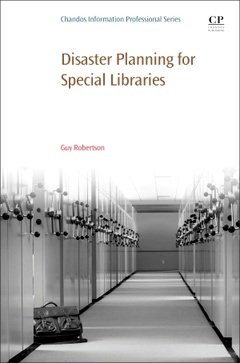Description
Disaster Planning for Special Libraries
Chandos Information Professional Series
Author: Robertson Guy
Language: English
Subject for Disaster Planning for Special Libraries:
Keywords
Agreement; Alliance; Alternative workspace; Apathy; Area; Audit; Audit report; Availability; BIA; Business continuity plan; Business impact analysis; Casualties; Challenges; Checklist; Circumstances; Collections; Concerns; Consultants; Contingency plan; Continuity; Costs; Crisis; Damage; Damage assessment; Decision-making; Deliverables; Disaster; Disaster declaration; Disaster plan; Disaster planning; Disaster response; Disasters; Emergency; Emergency equipment; Emergency management plan; Emergency operations center (EOC); Evacuation; Evaluation; Event recognition; External partners; Fire warden; Future; Futurologists; General philosophy; Hands-on operation; Host organization; Human-caused risks; In-depth coverage; In-house resources; Incident; Incomplete normalization; Inspection; Inspectors; Introduction; Job security; Library assets; Life safety; Likelihood; Location; Lone librarian; Magical thinking; Major emergency; Medications; Mental reactions; Mitigation; Moisture control vendors; Natural risks; Negative event; Negative events; Neighborhood; Normalization; Normalization plan; Normalization tasks; Observation; Operational resumption; Orientation; Orientation and training; Personal attributes; Personal safety; Personnel; Planning; Postevent communications; Predictions; Preparedness plan; Prevailing risks; Prioritization; Process; Proximity risks; Questionnaire; Recordkeeping; Recovery; Region; Response plan; Resumption; Risk assessment and analysis; Risks; Safety; Security risks; Service provider; Sign-off
320 p. · 15x22.8 cm · Paperback
Description
/li>Contents
/li>Readership
/li>Biography
/li>Comment
/li>
This volume serves as a reference resource, not only for people who have never considered the disaster planning process, but also for experienced planners interested in a variety of approaches to different aspects of planning.
The author discusses the role of the special librarian in the planning process and considers the relationship between special libraries and their host organizations. He emphasizes the importance of coordinating a special library?s plan with any in place for its host organization, and encourages librarians to demonstrate their planning skills for organization-wide benefits.
Early chapters summarize the initial phases of the planning process, which include preparedness and response measures. Subsequent chapters cover the assessment of damage to special library facilities and assets, the implications of declaring a disaster, the development of strategic alliances with key suppliers, orientation and training, succession planning, operational resumption, the normalization of library operations, and auditing a disaster plan. The concluding chapter discusses concerns that special librarians might have with regard to the future and its risks.
Appendices include examples of a risk assessment and analysis and a risk mitigation program, a strike and protest plan, an emergency equipment inspection and audit report, a pandemic management program, and disaster response manager?s kit.
2. First challenges
3. Assessing risks to your library
4. Preparedness and risk mitigation
5. Emergency and disaster response
6. Assessing the damage
7. Event recognition, disaster declaration, and crisis management
8. Strategic alliances: Internal and external partners
9. Operational resumption, succession planning, and postdisaster workspace
10. Postdisaster concerns of library personnel
11. Normalization
12. Orientation and training
13. Auditing your disaster plan
14. Future concerns for special librarians: a personal view
Appendix 1: Risk assessment and analysis: the Library and Records Centre of a Financial Services and Investments firm in Vancouver, British Columbia
Appendix 2: Law firm library: risk mitigation program
Appendix 3: Western Petroleum Research Institute Library
Appendix 4: Emergency equipment inspection and audit report
Appendix 5: Corporate library pandemic management program
Appendix 6: Disaster response manager’s kit
Corporate librarians and information professionals; corporate library board members and sponsors; managers responsible for security and planning; library directors; chief librarians; assistant librarians; senior library administrators in corporate libraries; security managers; technical services librarians; corporate IT librarians; Occupational Health and Safety (OHT) managers in corporate libraries; law librarians; medical librarians; government librarians; library space planners; building services managers and maintenance staff in buildings that contain corporate library facilities; SLA members.
- Presents essential information in an accessible manner
- Considers the disaster-related needs and experiences of special library personnel
- Discusses a variety of risks to special libraries in different kinds of physical locations
- Offers different approaches to a broad range of disaster planning topics in special libraries
- Provides examples of essential planning documentation



